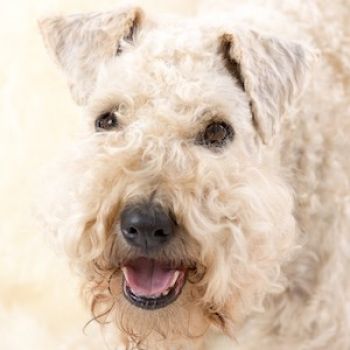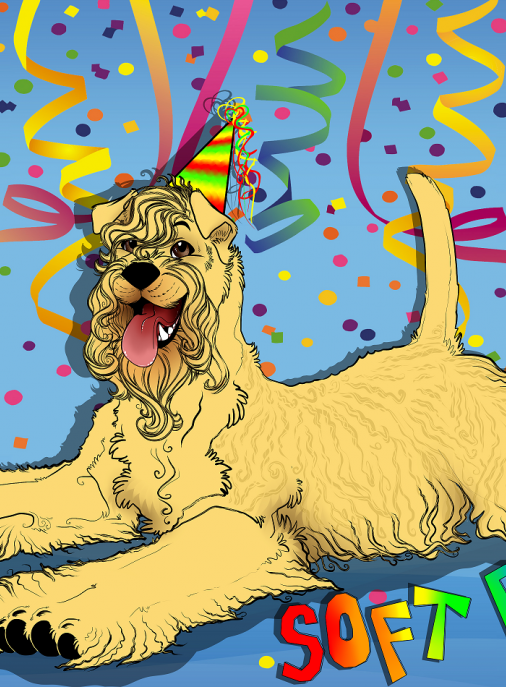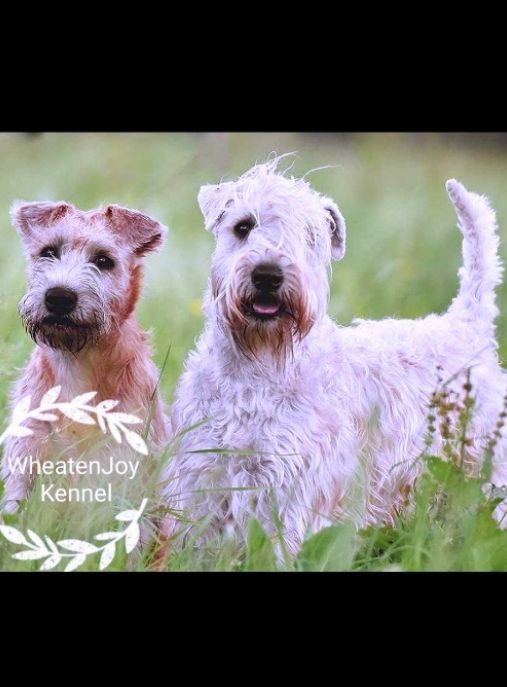The Irish Soft Coated Wheaten Terrier is a charming and lovable breed known for its soft, silky coat and friendly disposition. This medium-sized dog is often referred to as the "Wheaten" due to its wheat-colored coat, which ranges from pale beige to rich golden shades. With their playful nature and affectionate personality, Wheatens make excellent companions for families and individuals alike.
Originating from Ireland, the Soft Coated Wheaten Terrier has a rich history that dates back several centuries. This breed was primarily used as a versatile farm dog, performing various tasks such as herding, guarding livestock, and hunting vermin. Their soft coat provided protection from the harsh Irish climate, while their agility and intelligence made them adept at their working duties.
According to the FCI (Fédération Cynologique Internationale) typology, the Irish Soft Coated Wheaten Terrier belongs to Group 3 - Terriers. This group includes breeds that were originally developed for hunting and vermin control. Within this group, the Wheaten is classified under Section 1 - Large and Medium-sized Terriers.
The Soft Coated Wheaten Terrier is a versatile breed that suits a variety of owners. They are known for their friendly and sociable nature, making them excellent family pets. They are patient and gentle with children, making them ideal playmates. Additionally, their intelligence and eagerness to please make them relatively easy to train. However, it is important to note that they can be a bit stubborn at times, so consistent and positive reinforcement training methods work best.
In terms of physical characteristics, the Wheaten is a medium-sized dog with a sturdy build. On average, males stand between 18 to 19 inches (46 to 48 cm) tall at the shoulder, while females are slightly smaller, measuring between 17 to 18 inches (43 to 46 cm). Their weight typically ranges from 30 to 40 pounds (14 to 18 kg).
The Soft Coated Wheaten Terrier has a life expectancy of around 12 to 15 years, which is relatively long for a dog of its size. This breed is generally healthy, but like all dogs, they can be prone to certain health issues. Some common conditions that may affect Wheatens include protein-losing enteropathy, hip dysplasia, progressive retinal atrophy, and renal dysplasia. Regular veterinary check-ups, a balanced diet, and regular exercise can help maintain their overall health and well-being.
One of the most distinctive features of the Soft Coated Wheaten Terrier is its beautiful coat. Unlike most terriers, the Wheaten has a single-layered, soft, and silky coat that does not shed excessively. This makes them a suitable choice for individuals with allergies or those who prefer a low-shedding breed. However, their coat requires regular grooming to prevent matting and tangling. Regular brushing, trimming, and occasional professional grooming are necessary to keep their coat in good condition.
Another interesting fact about this breed is their slow maturation rate. Wheatens typically take longer to reach full maturity compared to other breeds. It can take up to three years for them to fully develop physically and mentally. This slow maturation rate often results in a playful and puppy-like temperament well into adulthood.
In conclusion, the Irish Soft Coated Wheaten Terrier is a delightful breed with a rich history and a charming personality. Their friendly nature, adaptability, and low-shedding coat make them a popular choice for families and individuals alike. With proper care, training, and socialization, the Wheaten can be a loyal and loving companion for many years to come.

The Irish Soft Coated Wheaten Terrier is a delightful and affectionate breed known for its friendly and outgoing nature. With their charming appearance and playful personality, Wheatens make wonderful companions for individuals and families alike. In this text, we will explore the character of Irish Soft Coated Wheaten Terriers, their behavior, and offer some insights into raising and training them.
One of the most notable traits of Wheatens is their friendly and sociable nature. They are known to be excellent with children and get along well with other pets, making them a great choice for families. These dogs thrive on human companionship and love to be involved in all family activities. They are often described as "people dogs" and are always eager to please their owners.
Wheatens are known for their happy-go-lucky attitude and boundless energy. They have a playful and mischievous streak, which can sometimes lead to them being labeled as "eternal puppies." They love to play games, fetch toys, and engage in interactive activities with their owners. Regular exercise is crucial for Wheatens to keep them physically and mentally stimulated, as they have a moderate to high energy level.
Despite their friendly nature, Wheatens can be protective of their families and make excellent watchdogs. They are alert and will bark to alert their owners of any potential threats. However, they are not typically aggressive and are more likely to greet strangers with a wagging tail rather than hostility.
When it comes to training, Wheatens are intelligent and eager to please, but they can also be a bit stubborn at times. They respond best to positive reinforcement techniques, such as praise, treats, and play. Harsh training methods or punishment can be counterproductive and may lead to resistance or anxiety in these sensitive dogs. Consistency and patience are key when training a Wheaten, and early socialization is essential to ensure they grow up to be well-rounded and confident adults.
Grooming is another important aspect of caring for a Wheaten. Their soft, silky coat requires regular brushing to prevent matting and tangling. Many owners choose to keep their Wheatens in a shorter "puppy cut" to make grooming easier. Regular bathing, nail trimming, and ear cleaning are also necessary to maintain their overall hygiene.
In conclusion, Irish Soft Coated Wheaten Terriers are friendly, sociable, and playful dogs that make excellent family pets. Their happy-go-lucky attitude and boundless energy bring joy to any household. With proper training, socialization, and regular exercise, Wheatens can grow up to be well-behaved and loving companions. If you are looking for a loyal and affectionate furry friend, the Irish Soft Coated Wheaten Terrier might be the perfect breed for you.
The Irish Soft Coated Wheaten Terrier is a charming and affectionate breed known for its soft, silky coat and playful nature. To ensure the well-being and happiness of your Wheaten Terrier, it is important to provide them with proper care and attention. Here are some tips on how to care for dogs of this breed, including what to do and what not to do:
1. Grooming: The Wheaten Terrier's coat requires regular grooming to keep it healthy and tangle-free. Brush their coat at least two to three times a week to prevent matting. Regularly check their ears for any signs of infection and clean them gently. Trim their nails regularly to avoid overgrowth and discomfort.
2. Exercise: Wheatens are an active breed and require regular exercise to keep them physically and mentally stimulated. Engage in daily walks, play fetch, or allow them to run in a securely fenced yard. However, avoid excessive exercise in hot weather as they can be prone to heatstroke.
3. Training: Start training your Wheaten Terrier from an early age to ensure they grow up to be well-behaved dogs. They are intelligent and eager to please, making them relatively easy to train. Use positive reinforcement techniques such as treats, praise, and play to motivate them. Socialize them with other dogs and people to prevent any potential behavioral issues.
4. Nutrition: Provide a balanced and nutritious diet to maintain your Wheaten Terrier's overall health. Feed them high-quality dog food that is appropriate for their age, size, and activity level. Avoid overfeeding to prevent obesity, which can lead to various health problems.
5. Health care: Regular veterinary check-ups are essential to monitor your Wheaten Terrier's health and catch any potential issues early on. Vaccinations, parasite prevention, and dental care should be part of their routine healthcare. Be aware of common health problems in this breed, such as protein-losing enteropathy, hip dysplasia, and allergies, and consult your vet if you notice any unusual symptoms.
6. Mental stimulation: Wheatens are intelligent dogs that thrive on mental stimulation. Provide them with interactive toys, puzzle games, and training sessions to keep their minds active. Lack of mental stimulation can lead to boredom and destructive behavior.
7. Family interaction: Wheatens are known for their love of human companionship. They thrive when they are part of the family and included in daily activities. Avoid leaving them alone for long periods as they can become anxious or develop separation anxiety.
What not to do:
1. Do not neglect grooming: Neglecting regular grooming can lead to matting, skin issues, and discomfort for your Wheaten Terrier. Regular brushing and grooming sessions are essential to maintain their coat's health and prevent any potential problems.
2. Do not use harsh training methods: Wheatens respond best to positive reinforcement training methods. Avoid using harsh techniques, physical punishment, or yelling, as it can damage their trust and lead to fear-based behaviors.
3. Do not overfeed: Wheatens have a tendency to gain weight easily, so avoid overfeeding or giving excessive treats. Obesity can lead to various health issues, including joint problems and reduced lifespan.
4. Do not skip veterinary check-ups: Regular veterinary check-ups are crucial for early detection of any health issues. Skipping these check-ups can lead to undiagnosed problems and potential complications.
5. Do not isolate them: Wheatens thrive on human companionship and can become anxious or develop behavioral issues if left alone for extended periods. Ensure they are included in family activities and have plenty of social interaction.
By following these care tips and providing your Irish Soft Coated Wheaten Terrier with love, attention, and proper care, you can ensure they live a happy and healthy life as a cherished member of your family.
The Irish Soft Coated Wheaten Terrier is a charming and distinctive breed known for its unique coat color. These dogs are typically seen in a beautiful shade of wheat, which gives them their name. The color of the Irish Soft Coated Wheaten Terrier's coat is a defining characteristic that sets them apart from other breeds.
The wheat color of these dogs is often described as a warm, golden hue that ranges from light to medium in intensity. It resembles the color of ripened wheat fields, exuding a sense of natural beauty and elegance. This color is present throughout the dog's entire coat, from the top of their head to the tip of their tail.
The wheat color of the Irish Soft Coated Wheaten Terrier's coat is not solid but rather exhibits a subtle variation in shades. This variation adds depth and dimension to their appearance, making their coat visually appealing. The different shades of wheat can be seen in the individual hairs that make up their coat, creating a lovely blend of colors.
The coat of the Irish Soft Coated Wheaten Terrier is typically soft and silky to the touch, further enhancing their overall appearance. It is a single-layered coat that lacks an undercoat, which contributes to its unique texture. The wheat color is evenly distributed throughout the coat, giving the dog a uniform and balanced appearance.
As these dogs mature, their coat color may undergo slight changes. Puppies of this breed often have a lighter shade of wheat, which gradually deepens and becomes richer as they grow older. This transition adds to the charm of the breed, as it showcases the dog's development and maturity.
In addition to their wheat-colored coat, Irish Soft Coated Wheaten Terriers may have other markings. These markings can appear in various shades of wheat or may be slightly darker, creating a contrast against the main coat color. Common areas for these markings include the ears, muzzle, and back. These markings, although not always present, add an extra touch of uniqueness to each individual dog.
The wheat color of the Irish Soft Coated Wheaten Terrier's coat is not only visually appealing but also serves a practical purpose. It provides excellent camouflage in outdoor environments, allowing them to blend in with their surroundings. This natural camouflage was particularly useful in their original role as farm dogs, where they would help herd and guard livestock.
In conclusion, the Irish Soft Coated Wheaten Terrier is renowned for its stunning wheat-colored coat. This warm and golden hue, with its subtle variations and soft texture, adds to the breed's overall charm and elegance. The wheat color, along with any additional markings, creates a visually appealing and unique appearance for each individual dog.
The Irish Soft Coated Wheaten Terrier is a medium-sized breed known for its friendly and affectionate nature. These dogs are generally healthy, but like any other breed, they are prone to certain health issues. Understanding the common diseases and taking appropriate care can help ensure the well-being of Irish Soft Coated Wheaten Terriers.
One of the most common health concerns in this breed is protein-losing enteropathy (PLE). PLE is a condition where the dog's intestines fail to absorb proteins properly, leading to weight loss, diarrhea, and malnutrition. Regular check-ups with a veterinarian and a balanced diet can help manage this condition.
Another prevalent health issue in Irish Soft Coated Wheaten Terriers is protein-losing nephropathy (PLN). PLN affects the kidneys and can lead to kidney failure. Symptoms include increased thirst, frequent urination, and weight loss. Early detection through regular urine and blood tests is crucial for managing PLN.
Dermatitis is also a common problem in this breed. Wheaten Terriers have a single-layered, soft, and silky coat that requires regular grooming to prevent matting and skin issues. Regular brushing, bathing, and trimming can help maintain a healthy coat and prevent skin infections.
Allergies are another concern for Irish Soft Coated Wheaten Terriers. They can be allergic to various environmental factors like pollen, dust mites, or certain foods. Allergies often manifest as skin itching, redness, and ear infections. Identifying and avoiding allergens, along with proper veterinary guidance, can help manage allergies effectively.
Hip dysplasia is a genetic condition that affects many dog breeds, including the Irish Soft Coated Wheaten Terrier. It is characterized by an abnormal development of the hip joint, leading to pain, lameness, and arthritis. Regular exercise, a balanced diet, and avoiding excessive jumping or rough play can help reduce the risk of hip dysplasia.
To maintain the overall health of Irish Soft Coated Wheaten Terriers, regular veterinary check-ups are essential. Vaccinations, parasite prevention, and dental care should be a part of their routine healthcare. A nutritious diet, appropriate exercise, and mental stimulation are crucial for their well-being.
Feeding a high-quality dog food that meets their nutritional needs is important. Avoiding overfeeding and providing a balanced diet can help prevent obesity, which can lead to various health issues. Fresh water should always be available.
Exercise is vital for Irish Soft Coated Wheaten Terriers to keep them physically and mentally stimulated. Daily walks, playtime, and interactive toys can help meet their exercise requirements. Mental stimulation can be achieved through training sessions, puzzle toys, and socialization with other dogs.
Regular grooming is necessary to maintain the Wheaten Terrier's coat. Brushing their soft, silky fur at least two to three times a week helps prevent matting and keeps their skin healthy. Regular bathing, ear cleaning, and nail trimming are also important parts of their grooming routine.
In conclusion, Irish Soft Coated Wheaten Terriers are generally healthy dogs, but they can be prone to certain health issues. Being aware of common diseases and taking appropriate care, including regular veterinary check-ups, a balanced diet, exercise, and grooming, can help ensure the overall health and well-being of these lovable dogs.
The Irish Soft Coated Wheaten Terrier is a medium-sized, active, and friendly breed known for its soft, silky coat. To ensure their overall health and well-being, it is crucial to provide them with a balanced and nutritious diet. Proper nutrition plays a vital role in maintaining their energy levels, promoting a healthy coat, and supporting their overall growth and development.
When it comes to feeding an Irish Soft Coated Wheaten Terrier, it is recommended to provide them with high-quality commercial dog food that is specifically formulated for their breed size and activity level. Look for dog food that lists real meat as the primary ingredient, as this ensures a good source of protein. Avoid dog foods that contain fillers, artificial additives, or by-products, as these can be detrimental to their health.
Protein is an essential component of a Wheaten Terrier's diet, as it helps in building and repairing tissues, supporting muscle development, and maintaining a healthy immune system. Aim for a dog food that contains around 20-25% protein content. Good sources of protein include chicken, turkey, beef, and fish.
In addition to protein, a well-balanced diet for an Irish Soft Coated Wheaten Terrier should also include carbohydrates, fats, vitamins, and minerals. Carbohydrates provide energy, and whole grains like brown rice, oats, and barley are excellent choices. Fats, such as omega-3 and omega-6 fatty acids, are essential for maintaining a healthy coat and skin. Look for dog foods that contain healthy fats from sources like fish oil or flaxseed.
It is important to note that Wheaten Terriers can be prone to food allergies or sensitivities. If you notice any signs of allergies, such as itching, gastrointestinal issues, or skin problems, consult with a veterinarian to determine if a specific ingredient needs to be avoided or if a specialized diet is required.
Feeding guidelines for Irish Soft Coated Wheaten Terriers can vary depending on their age, weight, and activity level. Puppies require more frequent meals, typically three to four times a day, while adult dogs can be fed twice a day. Always follow the recommended feeding guidelines provided by the dog food manufacturer and adjust the portion sizes based on your dog's individual needs.
In addition to a balanced diet, fresh water should always be available for your Wheaten Terrier. Hydration is crucial for their overall health and helps maintain proper digestion.
While it is important to provide a nutritious diet, it is equally important to avoid certain foods that can be harmful to Irish Soft Coated Wheaten Terriers. Some common foods to avoid include chocolate, caffeine, grapes, raisins, onions, garlic, avocados, and anything containing xylitol (a sugar substitute). These foods can be toxic to dogs and may cause serious health issues.
In conclusion, providing a well-balanced and nutritious diet is essential for the health and well-being of Irish Soft Coated Wheaten Terriers. Choose high-quality commercial dog food that is specifically formulated for their breed and activity level. Ensure the food contains adequate protein, carbohydrates, fats, vitamins, and minerals. Avoid foods that may cause allergies or are toxic to dogs. By following these guidelines, you can help your Wheaten Terrier thrive and enjoy a long, healthy life.











